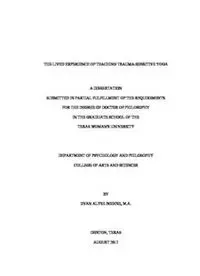
The Lived Experience of Teaching Trauma-Sensitive Yoga PDF
Preview The Lived Experience of Teaching Trauma-Sensitive Yoga
THE LIVED EXPERIENCE OF TEACHING TRAUMA-SENSITIVE YOGA A DISSERTATION SUBMITTED IN PARTIAL FULFILLMENT OF THE REQUIREMENTS FOR THE DEGREE OF DOCTOR OF PHILOSOPHY IN THE GRADUATE SCHOOL OF THE TEXAS WOMAN'S UNIVERSITY DEPARTMENT OF PSYCHOLOGY AND PHILOSOPHY COLLEGE OF ARTS AND SCIENCES BY EVAN ALYSE BODINE, M.A. DENTON, TEXAS AUGUST 2017 ProQuest Number:10271090 All rights reserved INFORMATION TO ALL USERS The quality of this reproduction is dependent upon the quality of the copy submitted. In the unlikely event that the author did not send a complete manuscript and there are missing pages, these will be noted. Also, if material had to be removed, a note will indicate the deletion. ProQuest 10271090 Published by ProQuest LLC ( 2017). Copyright of the Dissertation is held by the Author. All rights reserved. This work is protected against unauthorized copying under Title 17, United States Code Microform Edition © ProQuest LLC. ProQuest LLC. 789 East Eisenhower Parkway P.O. Box 1346 Ann Arbor, MI 48106 - 1346 TEXAS WOMAN’S UNIVERSITY DENTON, TEXAS September 30, 2016 To the Dean of the Graduate School: I am submitting herewith a dissertation written by Evan Alyse Bodine entitled “The Lived Experience of Teaching Trauma-Sensitive Yoga.” I have examined this dissertation for form and content and recommend that it be accepted in partial fulfillment of the requirements for the degree of Doctor of Philosophy with a major in Counseling Psychology. ______________________________ Jeff E. Harris, Ph.D., Major Professor We have read this dissertation and recommend its acceptance: ______________________________ Sally D. Stabb, Ph.D. ______________________________ Linda Rubin, Ph.D. ______________________________ Nicole Holmes, Ph.D. ______________________________ Department Chair Accepted: _______________________________ Dean of the Graduate School Copyright © Evan Alyse Bodine, 2017 all rights reserved. iii DEDICATION I dedicate this work to my family— Carl, Mom, and Dad. For teaching me love, balance, and curiosity. iv ACKNOWLEDGMENTS I would like to acknowledge those who have helped me throughout graduate school. Thank you to my dissertation chair, Dr. Jeff Harris, for providing me with support, feedback, and reassurance throughout this project. Most importantly, thank you for encouraging me to be true to my passions for therapy and yoga. I would also like to thank the members of my dissertation committee, Dr. Stabb, Dr. Rubin, and Dr. Holmes, for providing me with perspectives that strengthened this study and my writing. I would also like to express my gratitude to David Emerson, not only for his encouragement of this endeavor, but for his inspiring commitment to trauma-sensitive yoga. Thank you to my parents, for encouraging me to look inward and reflect from a young age. You both have always supported me, and I am grateful beyond words to have you in my life. Rachel, thank you for sharing in endless laughter and heartfelt words. Thank you to Carl, my partner. You have been by my side throughout graduate school and I am so thankful for your love, patience, and generosity. Thank you for supporting me, making me laugh, providing international tech support, and encouraging this dream of mine. Sharing this journey with you has made it so much more full and meaningful. Finally, I would like to thank my friends. Thank you to Caitlyn and Kerry, for your cross-country calls that reminded me of my roots while I grew so much throughout school. Kathryn, thank you for your deep connection and compassion as we began this professional endeavor. Thank you to my friends that I have met in my graduate program. v You all have shared your time, laughter, hugs, and tears. I feel honored to be part of your journeys. vi ABSTRACT EVAN ALYSE BODINE THE LIVED EXPERIENCE OF TEACHING TRAUMA-SENSITIVE YOGA AUGUST 2017 Some survivors of trauma may develop Posttraumatic Stress Disorder (PTSD; Briere & Scott, 2013). However, experiencing repeated trauma within a relationship or during childhood can result in complex posttraumatic symptoms. These survivors tend to develop symptoms that contribute to challenges with relationships, emotional regulation, consciousness, identity, and self-perception, as well as somatic complaints. Complex PTSD is a suggested diagnostic category that conceptualizes this unique expression of symptoms of survivors with complex traumatic histories (Herman, 1992; van der Kolk, 2006). Trauma-sensitive yoga (TSY; Emerson & Hopper, 2011) is an evidence-based complementary treatment that provides survivors with a way to engage with their bodies and the present moment. To date, no research has been conducted with TSY facilitators. Thus, the current study explored the lived experiences of 11 TSY facilitators. This inquiry used a phenomenological approach, using semi-structured interviews to understand how facilitating TSY impacts facilitators’ lives. Results yielded 9 themes: Attitudes and Experiences of Yoga, Professionalism and Professional Identity, Experience of Teaching, Impact of Mental Health Training, Impact of Personal Trauma History, Professional Impact, Personal Growth, Personal Challenges, and Future vii Professional Directions. Each theme was composed of several codes, which are explained in detail. The results were consistent with existing literature and added unique findings to the literature on yoga, yoga teachers, and trauma treatment. The implications of this study offer best practice recommendations for practice, training, and supervision of TSY facilitators as this trauma treatment modality grows in popularity and on an international scale. Implications for additional research endeavors are offered. viii TABLE OF CONTENTS Page COPYRIGHT .............................................................................................................. iii DEDICATION ............................................................................................................ iv ACKNOWLEDGMENTS ........................................................................................... v ABSTRACT ............................................................................................................... vii Chapter I. INTRODUCTION ............................................................................................ 1 Purpose of Project ............................................................................................. 8 Key Terms ......................................................................................................... 8 II. REVIEW OF LITERATURE .......................................................................... 11 Yoga ................................................................................................................ 11 Benefits ............................................................................................... 13 Yoga Therapy ...................................................................................... 15 Yoga Teachers ................................................................................................ 15 Trauma ............................................................................................................ 17 Posttraumatic Stress Disorder ............................................................ 19 Complex Posttraumatic Stress Disorder ............................................ 20 Traditional Conceptualizations of Posttraumatic Stress Disorder ..... 22 Behavioral .............................................................................. 23 Cognitive ................................................................................ 24 Holistic Conceptualizations ............................................................... 25 Traditional Treatments ....................................................................... 28 Exposure ................................................................................ 28 Cognitive Processing ............................................................. 28 Limitations of Traditional Treatments ................................... 29 Complementary Treatments ............................................................... 31 Yoga and Trauma ............................................................................... 32 ix
